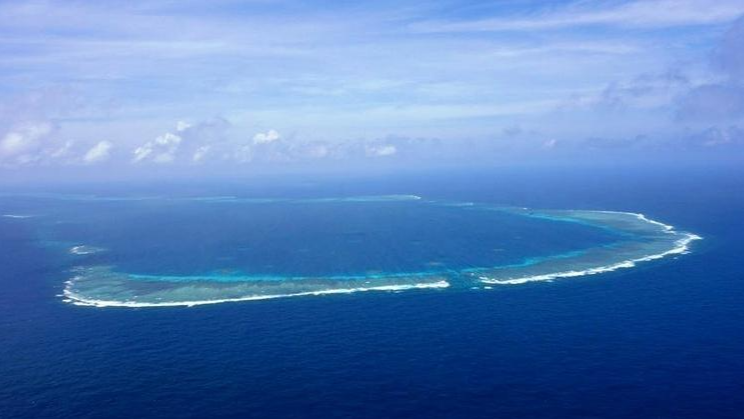
Tensions in the South China Sea have flared up in the past few days, mainly due to the Philippines' provocative activities that infringe on China's sovereignty in waters around Xianbin Reef.
Despite China's firm opposition and repeated warnings, the Philippines' Bureau of Fisheries and Aquatic Resources and the Philippine Coast Guard sent ships to intrude into the waters around Xianbin Reef on Sunday and Monday, prompting the China Coast Guard to carry out appropriate "control measures" in accordance with domestic and international law.
READ MORE: Beijing urges Manila to withdraw vessel
Though dubbed as humanitarian missions, the real purpose of Manila's reckless decision to send supplies to one of its coast guard vessels, which has been anchored in the lagoon of Xianbin Reef since April, is to cement the vessel's long-term presence there.
That inevitably has triggered countermeasures from China, as the Philippines' activities infringe on China's sovereignty. They also violate the Declaration on the Conduct of Parties in the South China Sea, which specifies that all parties should refrain from inhabiting previously uninhabited islands or reefs. This cannot but raise the vigilance of China over whatever step Manila is going to take next.
History urges caution given that the Philippines grounded an old naval vessel on China's Ren'ai Reef in 1999 to reinforce its illegal territorial claim there. It has since refused to move the vessel despite China's repeated calls for its removal from the Chinese waters.
Now Manila is employing the same model of encroachment at Xianbin Reef.
Speaking at a military forum in Manila on Tuesday, attended by military officials and senior diplomats from the United States and allied countries, the Philippine defense chief laid bare the pot-valiant stimulant that has brewed Manila's pugnacious claim-jumping. Alleging that China is the "biggest disruptor of peace" in the region, Defense Secretary Gilberto Teodoro Jr called for the Philippines' mutual defense treaty with the US "to be interpreted dynamically" and for "stronger collective multilateral action against China".
The head of the US "Indo-Pacific" Command later expounded on this by saying that discussions were underway and US escorts for Philippine vessels on resupply missions in the South China Sea were "an entirely reasonable option".
That the forum was organized by the US "Indo-Pacific" Command only serves to show who is pulling Manila's strings.
But whatever tricks and coercion the Philippines and the US resort to, any attempts to challenge China's sovereignty in the South China Sea are doomed to failure.
The latest incidents and Manila's staging of the farce of "a thief crying 'stop thief'" happened after China and the Philippines agreed to "restore trust" and "rebuild confidence" at a high-level meeting last month. The announcement that the two sides had reached an agreement on the need to manage their maritime disputes seemed to be backed up by a provisional arrangement on Manila's resupply missions to the grounded naval ship at Ren'ai Reef.
ALSO READ: Manila will have to bear the consequences
That China's response to the Philippines' reneging on that agreement has so far been extremely restrained indicates it treasures its traditional friendship with the Philippines, and is doing everything possible to prevent peace and stability in the South China Sea being jeopardized.
Yet it seems that some in the Philippines, encouraged by the US, have taken China's show of goodwill as a sign of weakness, and are intent on trying to test the firmness of its bottom line on sovereignty. That the Philippines took the representatives of several media outlets on board its coast guard vessels for Monday's provocative intrusion into Chinese waters reflects its intent to turn up the heat in the South China Sea at the instigation of Washington.
The two unruly allies that are the true disruptors of peace and stability in the South China Sea should bear in mind that China has both sufficient means and resolve to safeguard the country's sovereignty and territorial integrity. Manila should reconsider the wisdom of putting its trust in Washington lest it is emboldened to go too far on a dangerous path.


